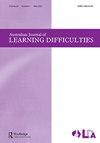Investigating the efficacy of using error analysis data to inform explicit teaching of spelling
IF 1.6
Q3 EDUCATION, SPECIAL
引用次数: 3
Abstract
ABSTRACT Empirical evidence supports the view that explicit teaching can make a positive difference to learning; however, further research is needed to understand the impact on learning to spell if spelling error analysis is used to inform explicit spelling instruction. This paper presents findings of an intervention study involving 572 students in Years 3 to 6 from 31 classes across four Australian schools. Fourteen teachers from two of the participating schools engaged in an intervention. This involved utilising spelling error analysis data to systematically plan and implement explicit and targeted spelling instruction. Sixteen teachers from the two comparison schools followed a “business-as-usual” pedagogy which appeared less targeted and explicit. Results indicate that all classes in the intervention group demonstrated a statistically significant improvement in spelling while only one comparison class demonstrated a statistically significant improvement. The promising findings highlight the power of using assessment-informed practices to explicitly teach spelling skills that are relevant to student needs.使用错误分析数据为拼写显性教学提供信息的有效性调查
经验证据支持外显教学对学习产生积极影响的观点;然而,如果使用拼写错误分析来为明确的拼写教学提供信息,那么对学习拼写的影响还需要进一步的研究。本文介绍了一项干预研究的结果,该研究涉及澳大利亚四所学校31个班级的572名3至6年级学生。来自两所参与学校的14名教师参与了一次干预。这包括利用拼写错误分析数据系统地计划和实施明确和有针对性的拼写指导。来自两所比较学校的16名教师采用了“一切照旧”的教学法,这种教学法似乎不那么有针对性和明确。结果表明,干预组的所有班级在拼写方面都有统计学上的显著改善,而只有一个比较班级在拼写方面有统计学上的显著改善。这些有希望的发现强调了使用评估信息实践来明确教授与学生需求相关的拼写技能的力量。
本文章由计算机程序翻译,如有差异,请以英文原文为准。
求助全文
约1分钟内获得全文
求助全文
来源期刊

Australian Journal of Learning Difficulties
EDUCATION, SPECIAL-
CiteScore
1.80
自引率
11.10%
发文量
8
 求助内容:
求助内容: 应助结果提醒方式:
应助结果提醒方式:


